September 8, 2025

This article presents essential strategies and resources designed to empower candidates in their pursuit of success on the RBT exam.
Understanding the exam format is paramount; it sets the stage for effective preparation. Candidates must utilize high-quality study materials and engage in practice through mock tests to refine their skills. Furthermore, managing test anxiety is crucial—it's not just about knowledge, but also about confidence on test day.
By adopting these strategies, candidates can significantly enhance their performance and approach the exam with assurance.
Understanding the nuances of the Registered Behavior Technician (RBT) exam is crucial for achieving success in this competitive field. With a structured format and a diverse range of content areas, candidates encounter both opportunities and challenges as they prepare for this critical assessment.
What strategies can aspiring RBTs employ to navigate the exam's complexities while enhancing their knowledge and confidence? This article explores nine essential questions designed to empower candidates, optimizing their preparation and significantly boosting their chances of success on exam day.
The [RBT exam questions](https://connectncareaba.com/rbt-exam) serve as a vital evaluation tool designed to gauge candidates' understanding of essential behavior analysis concepts and practices. The RBT exam questions consist of 85 multiple-choice items that must be completed within a 90-minute timeframe. The assessment covers several key content areas:
Additionally, it includes 10 unscored pilot items, which are utilized to evaluate potential future questions.
Understanding these components is crucial for for the RBT exam questions. By grasping the assessment's structure, candidates can allocate their study time wisely and focus on the sections that carry the most weight. For instance, since Skill Acquisition constitutes the largest portion of the assessment, prioritizing this area can significantly enhance your chances of success. Moreover, practicing with RBT exam questions can help familiarize you with the test format and identify any knowledge gaps.
Case studies underscore the importance of thorough preparation. Individuals who engage in structured learning plans and utilize resources such as practice tests and RBT exam questions typically achieve better outcomes. Furthermore, employing effective learning strategies, like active participation and group collaboration, can improve comprehension and retention of the material.
As Fayge Orzel states, "Grasping the assessment's format is essential for efficient learning and preparation." As you prepare for the RBT assessment, remember that a solid understanding of its components, coupled with a strategic approach to studying, can lead to increased confidence and improved performance on test day. To optimize your success, consider developing a study schedule aligned with the content area percentages.

The RBT Task List is essential for success in the assessment, encompassing critical areas such as measurement, evaluation, and behavior reduction strategies. Understanding each task comprehensively is crucial; mastering these concepts and their practical applications will significantly enhance your ability to tackle during the assessment.
Successful candidates often focus their studies on these vital fields, employing specific methods like practice tests that include RBT exam questions and review groups to deepen their comprehension. Notably, historical data indicates a decline in the percentage of individuals passing the RBT assessment, underscoring the need for effective learning strategies.
For instance, applicants who actively engage with the Task List and apply its principles in real-world scenarios typically achieve superior outcomes, as evidenced by cases showing improved results for those who prioritize these key areas. By focusing on these core components, you can build a solid foundation for your RBT preparation, ultimately leading to greater success.
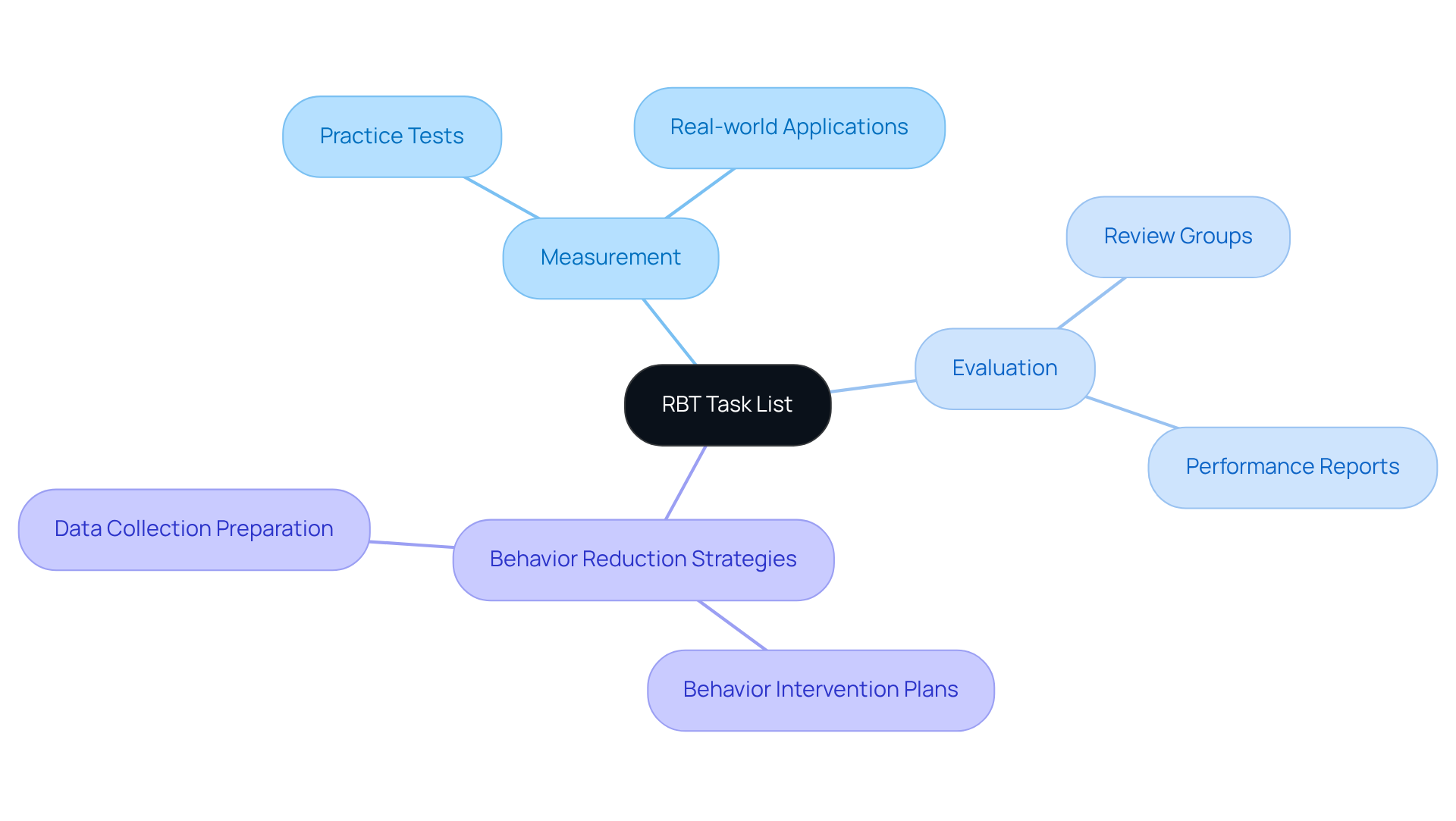
To effectively prepare for the RBT exam questions, it is crucial to leverage a diverse array of resources specifically tailored for this certification. Textbooks that cover the principles of behavior analysis, along with comprehensive study guides, serve as foundational resources. Online courses offer interactive learning experiences, allowing candidates to engage with the material actively. The Behavior Analyst Certification Board (BACB) website is an invaluable resource, providing the latest updates on exam content and requirements, including the upcoming 2026 RBT requirements changes. Additionally, the BACB Newsletter can be referenced for ongoing updates regarding RBT certification. ABA-focused forums can facilitate discussions and insights from peers and experienced professionals, enhancing the learning experience.
Real-world examples highlight the effectiveness of these resources. For instance, numerous accomplished individuals have stated that organized learning materials aided them in understanding intricate ideas more readily. Furthermore, educational videos detailing the steps to RBT certification can clarify the process and requirements, making them an excellent supplement to traditional study methods. As Caden Miller aptly states in his resource, "RBT Exam Study Guide 2024: Your Roadmap to Excellence in Registered Behavior Technician Licensure!" this emphasizes the importance of a . By merging these resources, including in-service training requirements as part of RBT professional development, individuals can enhance their understanding and improve their performance on the RBT exam questions.
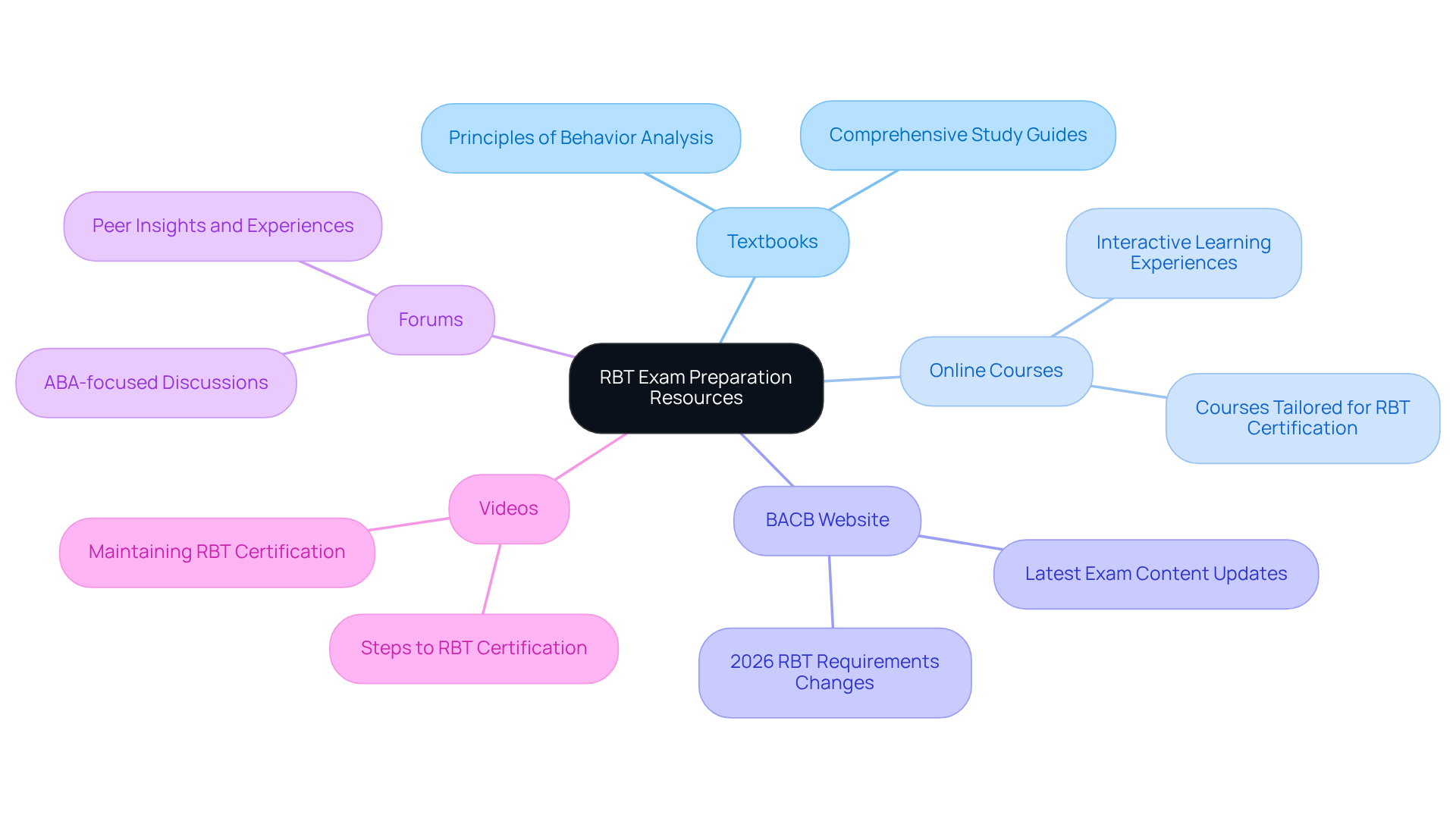
Participating in practice tests is a critical step in preparing for the RBT assessment. It allows individuals to evaluate their understanding and pinpoint areas needing improvement. Many online platforms offer practice tests that closely mirror the actual RBT assessment format, providing a realistic testing experience. These assessments not only refine test-taking strategies but also boost confidence as candidates familiarize themselves with the structure and timing of the exam.
Educators emphasize that simulating the test experience through practice assessments can significantly enhance performance. As one educator aptly stated, "Good preparation is key." Candidates who regularly engage with practice assessments report feeling more prepared and less anxious on test day, supported by the national average first-attempt pass rate of 70-80%.
Practical examples indicate that those who incorporate practice assessments into their study routines often achieve higher success rates, with the typical first-attempt success rate for the RBT assessment hovering around 67%. Moreover, understanding the test structure—comprising 85 questions to be completed in 90 minutes—is essential for effective preparation.
To maximize success, candidates should create a that allocates time for practice assessments.
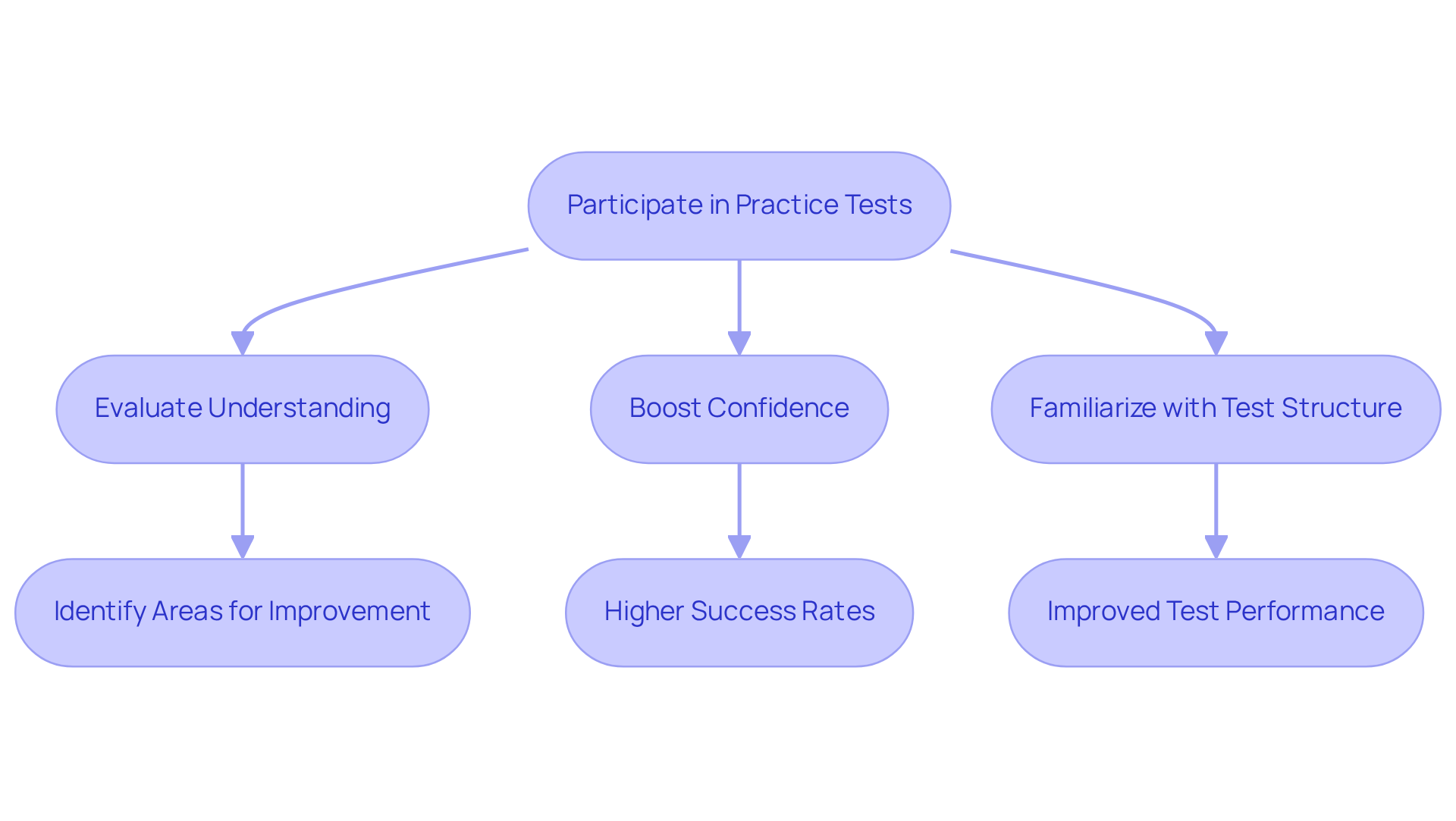
On test day, efficient time management is not just beneficial; it is essential for success. Start by dividing the overall test duration by the number of questions to establish a target time for each question. For example, with 90 minutes available for 75 questions, aim to spend approximately 1.2 minutes per question. Vigilantly monitor the clock and adjust your pace as needed to ensure you have time to review your answers before submission. In the words of John F. Kennedy, 'We must use time as a tool, not as a couch.' Embracing this mindset will help you stay focused and proactive throughout the assessment.
Moreover, consider the critical role of pacing; effective time management can dramatically alleviate stress and enhance your performance. As you work through the questions, prioritize those you find easier, reserving ample time for the more challenging ones later. This strategy not only boosts your confidence but also . Remember, 'Time waits for no one,' underscoring the urgency of prudent time management.
By implementing these strategies and crafting a personalized time management plan for your assessment preparation, you can approach the RBT exam questions with a clear and effective strategy, ensuring you make the most of your time and efforts.
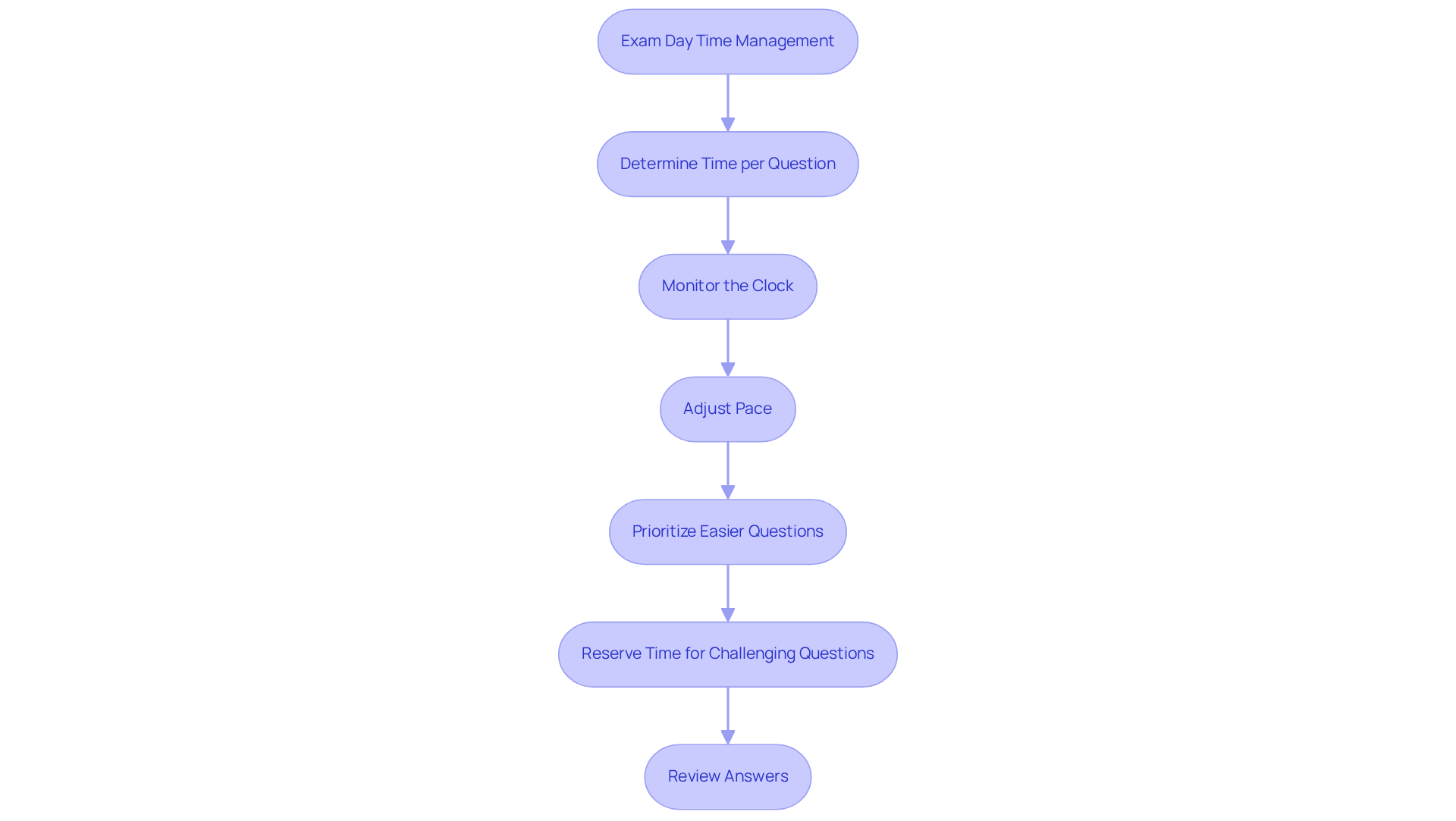
The RBT assessment employs a scoring method that evaluates individuals based on the number of correct responses. Typically, a passing score is considered to be at least 68 out of 85 questions, as determined by the Behavior Analyst Certification Board (BACB). Understanding these is crucial for candidates, enabling them to prioritize their study topics effectively.
The assessment consists of:
with a total duration of 90 minutes. Familiarizing oneself with the assessment's framework and the importance of each content area can significantly enhance preparation strategies. Furthermore, applicants should be aware that the BACB does not disclose the exact passing score, underscoring the importance of mastering essential concepts across all areas.
Engaging in practice assessments that mirror the actual test format is highly recommended, as it helps individuals become acquainted with the types of questions and improves their performance. By grasping the intricacies of the RBT evaluation grading system, candidates can tailor their preparation efforts to focus on aspects that will boost their chances of success.
As Daniel Carter aptly notes, "By understanding the core of the RBT assessment, its structure and evaluation standards, and employing learning methods suited to your requirements, you can enhance your likelihood of achieving success.
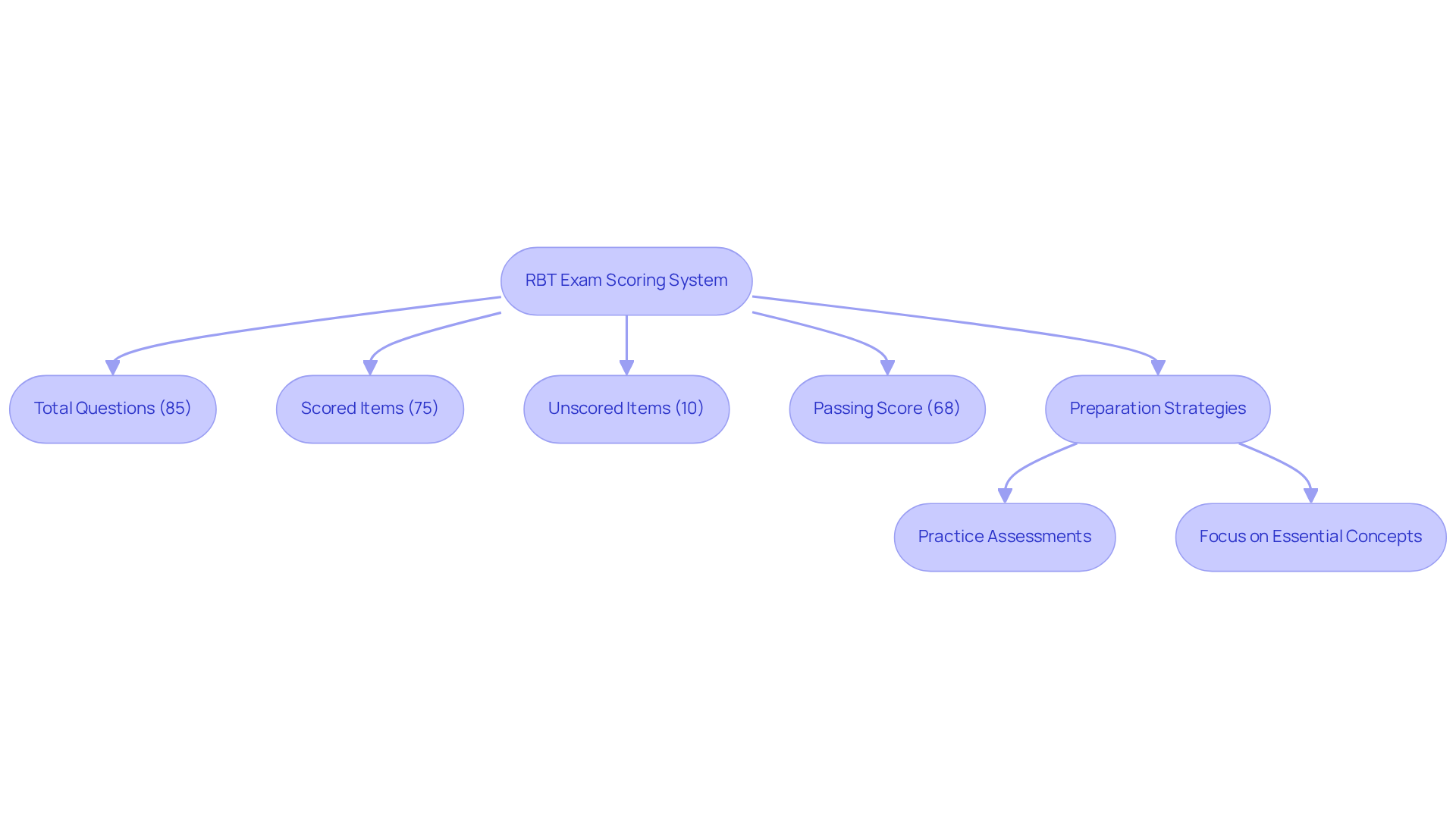
To enhance your performance on the RBT exam questions, consider implementing several effective strategies. Begin by addressing the easier RBT exam questions first; this approach not only boosts your confidence but also allows you to accumulate points quickly. When confronted with challenging questions, to narrow down your options, thereby increasing the likelihood of selecting the correct one. If uncertainty persists, do not hesitate to make educated guesses based on your knowledge and instincts. Practicing these techniques during your learning sessions will help them become second nature by the time you answer the RBT exam questions.
Real-world examples illustrate the effectiveness of these strategies. For instance, many successful candidates emphasize the importance of time management—allocating time wisely across questions ensures that you can address all items without feeling rushed. Additionally, incorporating quotes from experienced behavior analysts can provide motivation and insight. One noted expert remarked that 'the right preparation can make all the difference,' underscoring the value of a structured study plan combined with practical test-taking techniques. By adopting these strategies, you can approach the RBT exam questions with confidence and clarity.
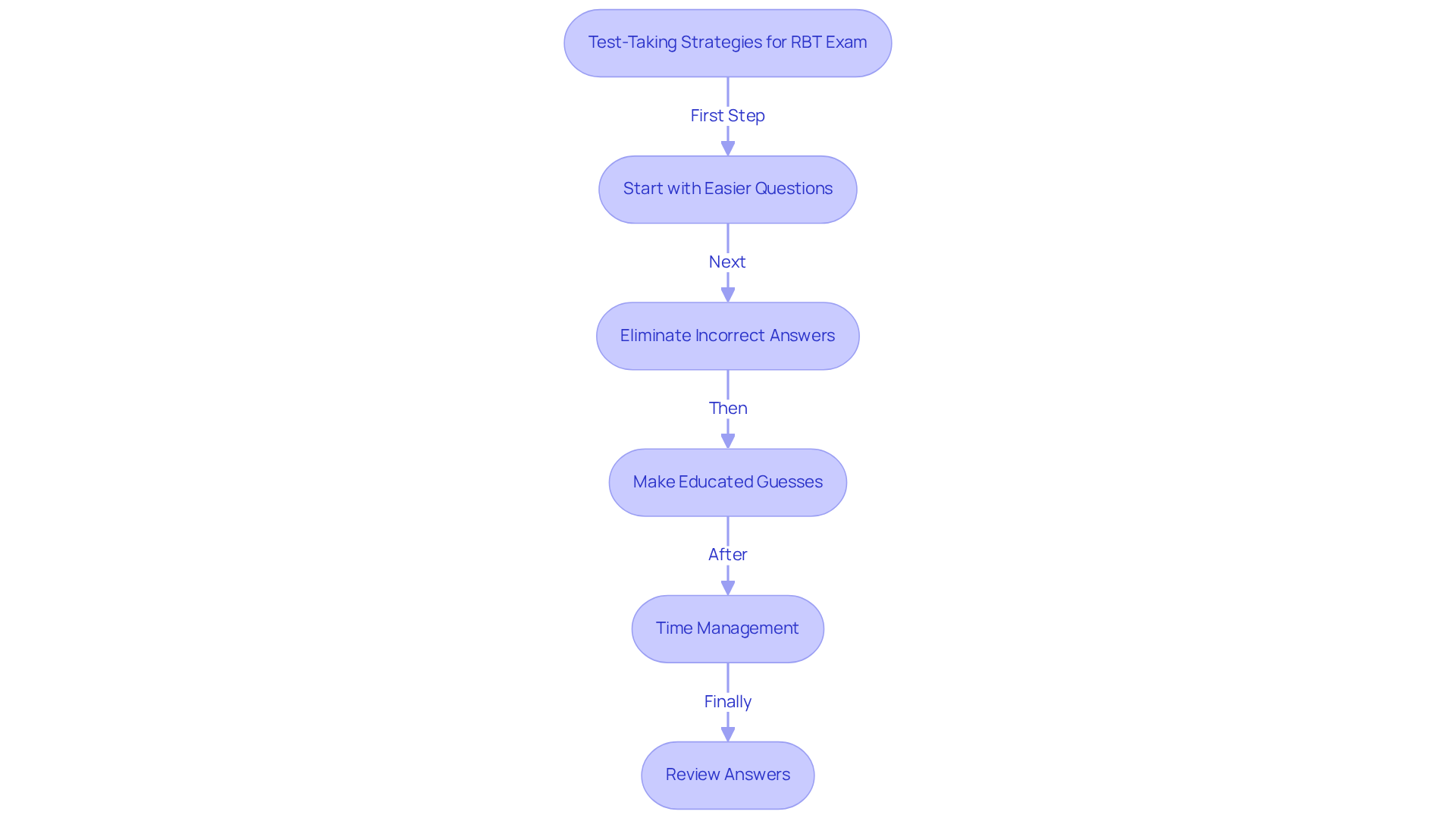
Creating flashcards or a glossary of essential terms in behavior analysis is a vital strategy for mastering key concepts that will help in answering RBT exam questions successfully. Did you know that 951 individuals are actively seeking quotes related to RBT preparation? This statistic highlights a strong interest in that can improve performance on the RBT exam questions. Consistently revisiting these terms not only assists in swift recollection during assessments but also enhances comprehension of the discipline's terminology.
Incorporating real-world examples, such as the structured approach to behavior reduction, can significantly enhance your grasp of terminology. This method involves:
Such practical applications reinforce the importance of terminology mastery, as understanding these concepts is crucial for developing targeted interventions.
Furthermore, the importance of terminology mastery extends beyond assessment preparation; it is crucial for effective communication among experts in the field. As Skinner noted, 'the way positive reinforcement is applied is more important than its quantity.' This emphasizes that understanding the nuances of behavior analysis can lead to better outcomes in practice. By concentrating on these essential ideas, RBTs can broaden their knowledge base and boost their performance in both practical applications and RBT exam questions.
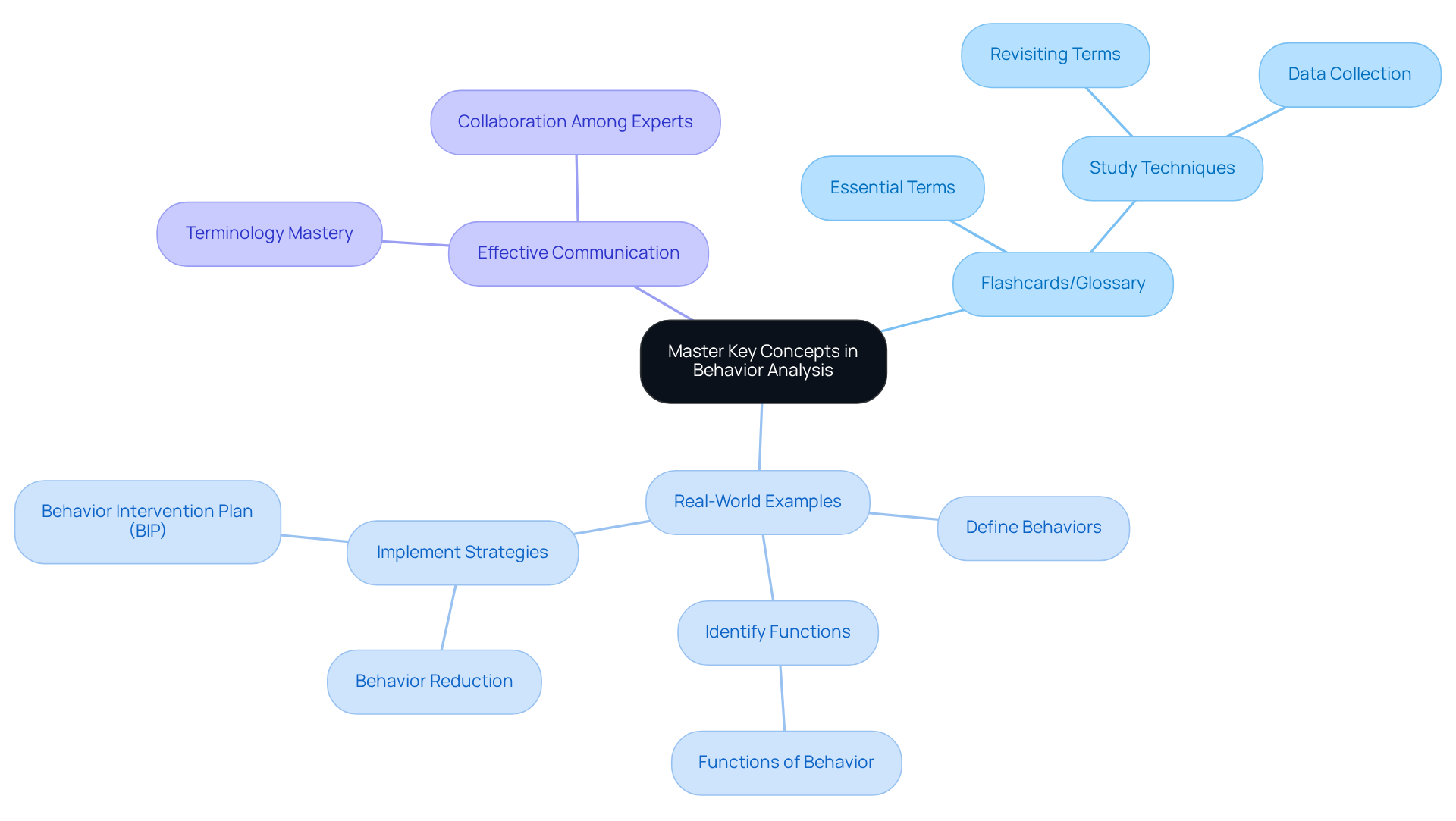
To effectively manage test anxiety, practice relaxation techniques such as:
These strategies not only enhance familiarity with the test format but also equip you to apply them efficiently on test day. For instance, deep breathing can soothe the nervous system, while visualization methods assist in mentally preparing for a successful test experience. Mindfulness exercises promote present-moment awareness, reducing the tendency to dwell on anxious thoughts.
Real-world instances demonstrate that individuals who engage in these practices report feeling more centered and focused during their assessments. Psychologists emphasize that embracing these relaxation techniques can significantly enhance performance by mitigating anxiety and fostering a positive mindset. Remember, individuals must respond accurately to at least 80% of the [RBT exam questions](https://connectncareaba.com/rbt-exam) to succeed in the RBT assessment, highlighting the critical nature of managing anxiety effectively.
Furthermore, remaining composed during the assessment is essential, as candidates will receive an initial score report after completion, which can influence their confidence. Dr. Greg Vander Wal notes that anxiety is our body's response to stress, underscoring the importance of these techniques. The goal is to approach the test with assurance, viewing it as an opportunity to showcase your understanding rather than a source of anxiety.
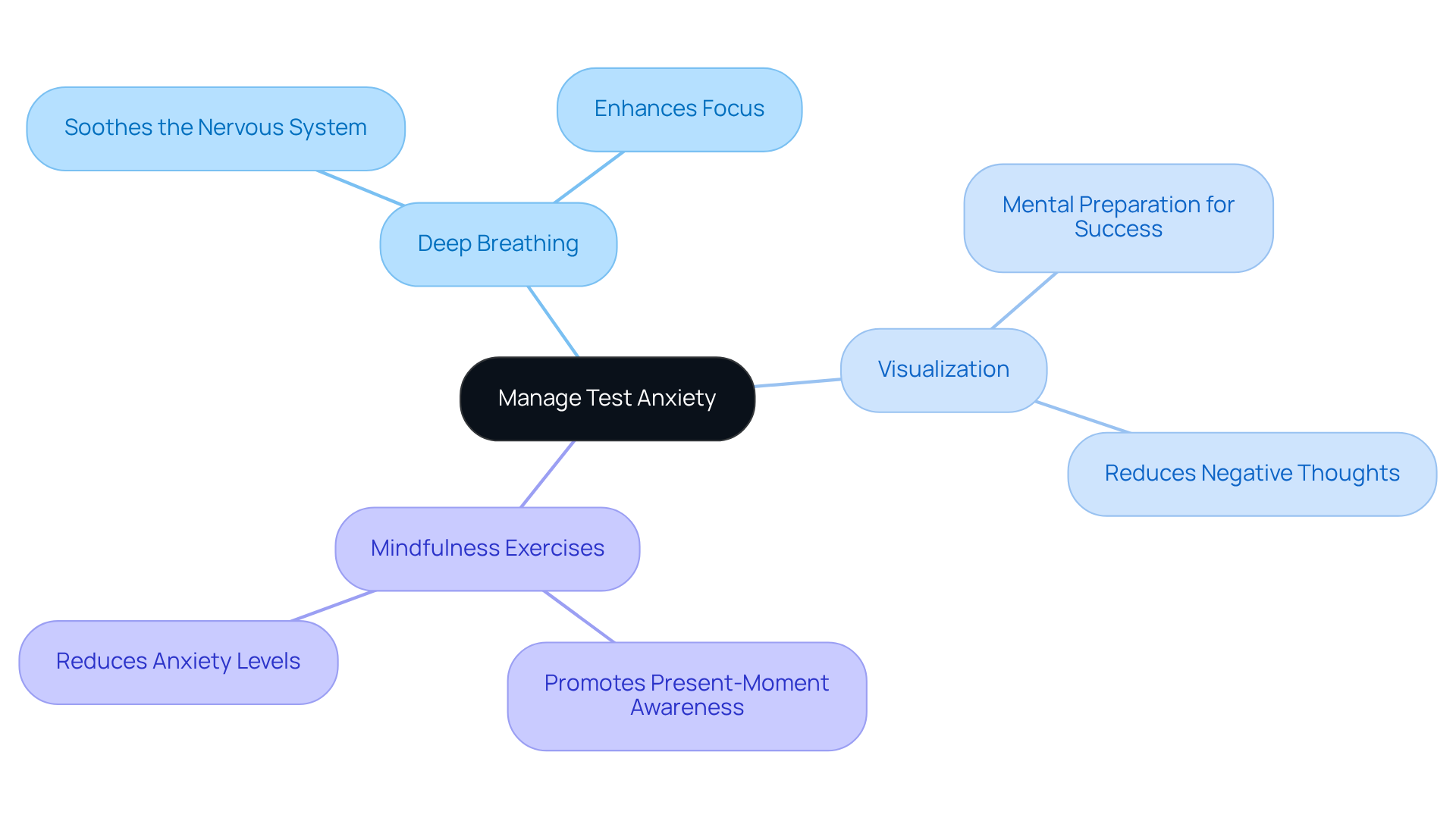
Hire ABA provides an extensive range of resources designed to enhance RBT assessment preparation, including detailed study guides, informative webinars, and invaluable networking opportunities with seasoned experts in the field. Engaging with these resources not only deepens your understanding of the assessment material but also connects you with colleagues and mentors who can offer guidance throughout your journey.
Networking is essential for succeeding in RBT exam questions. Those who actively participate in frequently report increased confidence and better knowledge retention. These interactions promote the exchange of effective study strategies and real-world examples that clarify complex concepts. Insights from Board Certified Behavior Analysts (BCBAs) underscore that building a professional network can lead to mentorship and guidance opportunities, which are vital for navigating the assessment process.
Moreover, completing a 40-hour training that covers the RBT task list is imperative, as this foundational knowledge is crucial for effectively tackling the RBT exam questions. Candidates must also recognize that a minimum score of 80% on the RBT exam questions is necessary to pass the RBT assessment, highlighting the significance of thorough preparation. Additionally, practicing with RBT exam questions and timed simulations can greatly enhance test readiness.
Hire ABA strengthens these connections, ensuring that individuals not only prepare academically but also gain access to a network of professionals who understand the challenges of the RBT assessment. By leveraging these resources and networking opportunities, candidates can significantly enhance their preparation for the RBT exam questions and increase their chances of success on test day. Remember, prioritizing self-care during exam preparation, including sufficient sleep and nutrition, is essential for optimal cognitive performance.
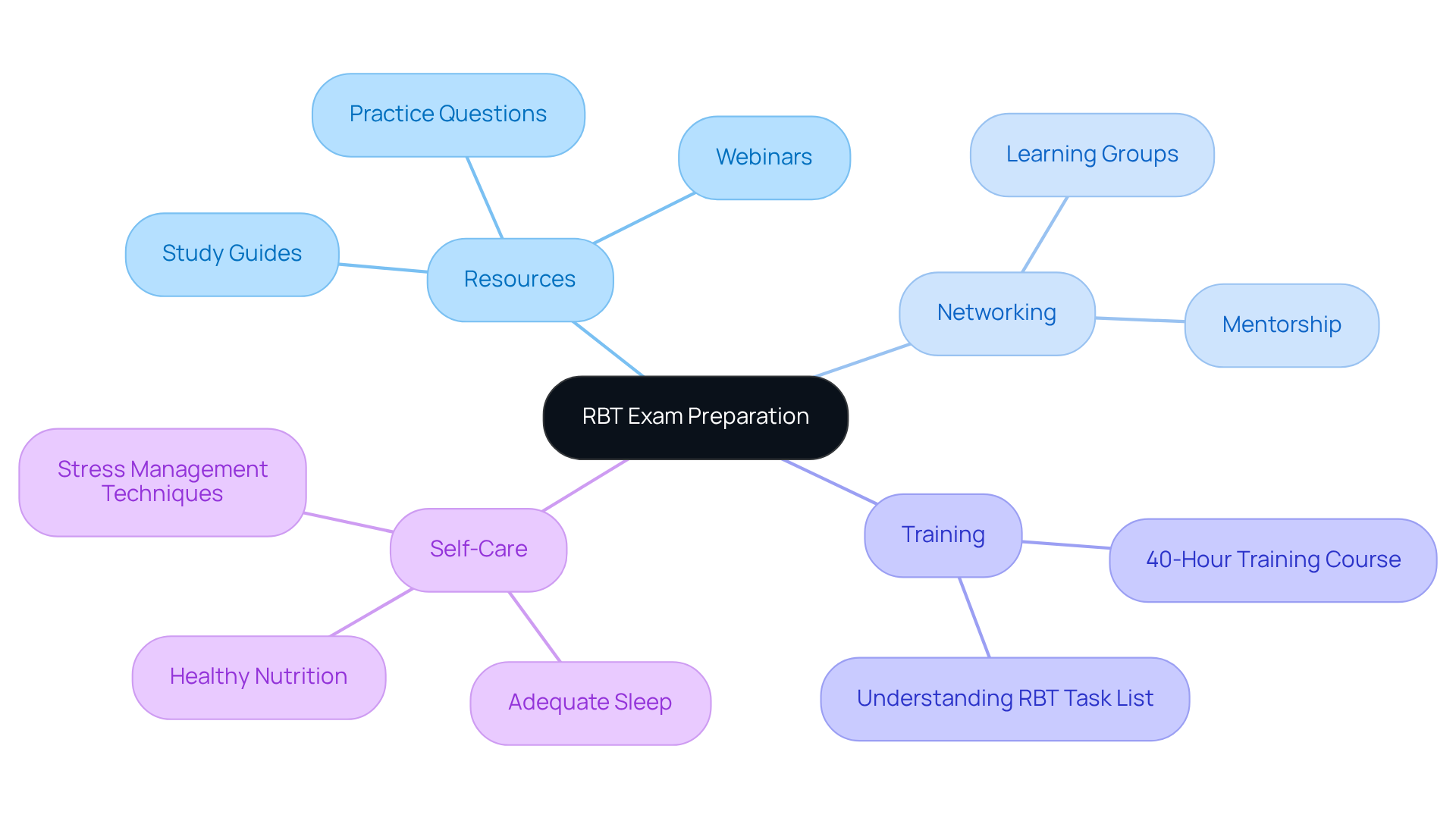
Mastering the RBT exam is not just an objective; it is a necessity in the growing field of behavior analysis. Understanding the exam format, focusing on essential content areas, and utilizing effective study materials are crucial strategies that can significantly enhance your chances of success. By grasping the structure of the RBT assessment and prioritizing the most significant content areas, candidates can elevate their preparation to new heights. Furthermore, integrating practice exams into your study routine allows you to simulate the test experience, refine your test-taking strategies, and manage time effectively during the actual assessment.
Key insights from the article underscore the importance of thorough preparation. Mastering essential terminology and employing techniques to manage test anxiety are vital components of a successful strategy. Engaging with resources like Hire ABA not only provides valuable study materials but also fosters networking opportunities that can further support you in your journey. As the RBT exam poses a challenge, approaching it with confidence and a clear plan is essential, ensuring that all aspects of preparation are thoroughly addressed.
Ultimately, success on the RBT exam transcends merely passing; it is about building a solid foundation for a rewarding career in behavior analysis. Candidates are encouraged to take proactive steps in their preparation, developing comprehensive study plans and leveraging available resources and support networks. By committing to a well-rounded approach, you can not only excel in your exam but also lay the groundwork for effective practice in the field.
What is the format of the RBT exam?
The RBT exam consists of 85 multiple-choice questions that must be completed within a 90-minute timeframe. It includes 10 unscored pilot items used to evaluate potential future questions.
What are the key content areas covered in the RBT exam?
The RBT exam covers several key content areas: Skill Acquisition (40%), Behavior Reduction (25%), Documentation and Reporting (15%), Measurement (10%), and Assessment (10%).
How can candidates effectively prepare for the RBT exam?
Candidates can prepare effectively by understanding the exam structure, prioritizing study time based on content area percentages, practicing with RBT exam questions, and engaging in structured learning plans and review groups.
What is the significance of the RBT Task List in exam preparation?
The RBT Task List encompasses critical areas such as measurement, evaluation, and behavior reduction strategies. Mastering these concepts and their practical applications is vital for success in the RBT exam.
What types of study materials are recommended for RBT exam preparation?
Recommended study materials include textbooks on behavior analysis principles, comprehensive study guides, online courses, and resources from the Behavior Analyst Certification Board (BACB) website, which provides updates on exam content and requirements.
How can real-world applications enhance RBT exam preparation?
Engaging with the Task List and applying its principles in real-world scenarios can improve understanding and lead to better outcomes, as evidenced by candidates who prioritize these key areas in their studies.
What role do forums and educational videos play in RBT exam preparation?
ABA-focused forums facilitate discussions and insights from peers and experienced professionals, while educational videos can clarify the RBT certification process and requirements, serving as valuable supplements to traditional study methods.
Our expert recruitment strategies and AI-driven sourcing ensure that you receive top-notch candidates quickly, without compromising on quality. Whether you’re looking for BCBAs, Clinical Directors, or RBTs, we’ve got you covered.